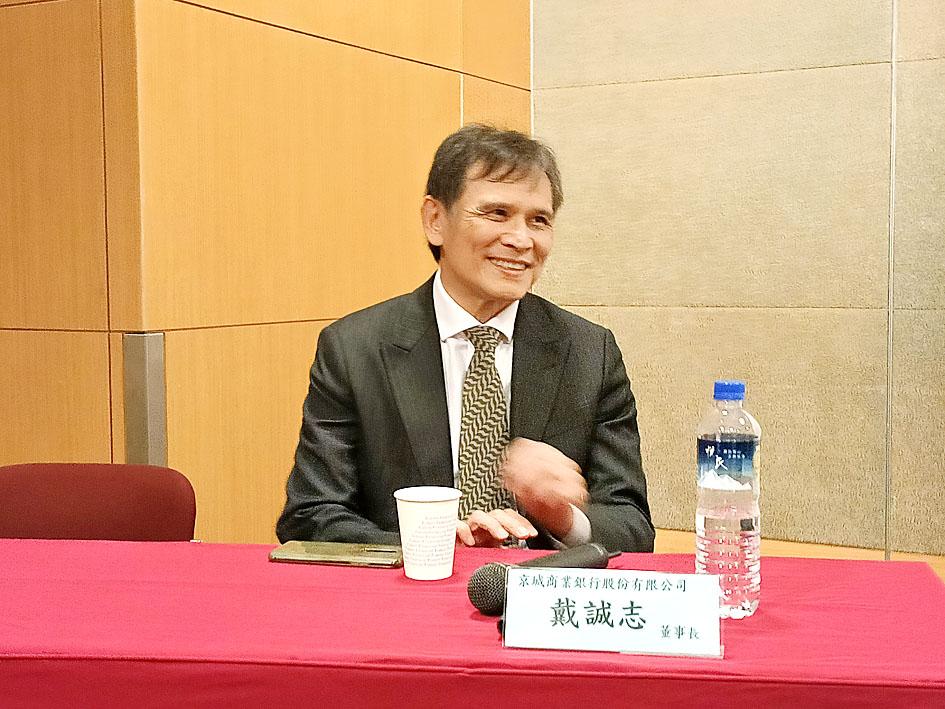King’s Town Bank (京城銀行) yesterday proposed to distribute a cash dividend of NT$1.8 per share based on last year’s earnings, becoming the nation’s third bank to surpass the regulatory limit of NT$1.5 per share for cash dividends.
Article 50 of the Banking Act (銀行法) demands that a bank set at least 30 percent of its net profit as legal reserve each year.
Until a bank’s accumulated legal reserve reaches the level of its paid-in capital, the cash dividend it can distribute would be capped at NT$1.5 per share, according to the act.

Photo: Lee Chin-hui, Taipei Times
Shanghai Commercial and Savings Bank Ltd (上海商業儲蓄銀行) was the first bank in Taiwan that met the requirements, paying cash dividends of NT$1.8 per share in 2017, NT$2 in 2018 and NT$2.05 in 2019, company data showed.
State-run Mega International Commercial Bank (兆豐銀行) came in second, paying cash dividends of NT$1.96 per share in 2018 and NT$1.92 in 2019.
Both Shanghai Commercial and Mega Bank have not announced their cash dividend proposals for last year.
King’s Town’s accumulated legal reserve reached NT$11.43 billion (US$403.9 million) last year, higher than its paid-in capital of NT$11.21 billion, the Tainan-based bank told an investors’ conference in Taipei.
As the bank’s earnings per share hit a record NT$4.9 last year, the proposed cash dividend of NT$1.8 per share represents a payout ratio of 36.73 percent.
“We hope our distribution remains stable and consistent for years,” King’s Town chairman Terence Tai (戴誠志) said. “We expect our cash dividend to stand at least NT$1.8 for the next five to 10 years. That is our commitment to our shareholders.”
With the bank’s share price falling 2.66 percent to NT$38.45 in Taipei trading yesterday, the proposed cash dividend of NT$1.8 per share suggested a yield rate of 4.68 percent.
King’s Town reported that its net profit last year grew 61.51 percent year-on-year to NT$5.49 billion, which it attributed to a double-digit rise in its net interest income due to lending growth and good returns from overseas bond investments, while provision dropped 71.96 percent from a year earlier.
Net interest income grew 10.32 percent to NT$5.25 billion, while fee income increased 3.73 percent to NT$1.91 billion, company data showed.
The bank's return on assets (ROA) and return on equity (ROE) reached 2.06 percent and 14.31 percent last year respectively.
The bank holds a cautious, but optimistic outlook for this year, expecting its net interest margin to remain flat, it said.

TECH BOOST: New TSMC wafer fabs in Arizona are to dramatically improve US advanced chip production, a report by market research firm TrendForce said With Taiwan Semiconductor Manufacturing Co (TSMC, 台積電) pouring large funds into Arizona, the US is expected to see an improvement in its status to become the second-largest maker of advanced semiconductors in 2027, Taipei-based market researcher TrendForce Corp (集邦科技) said in a report last week. TrendForce estimates the US would account for a 21 percent share in the global advanced integrated circuit (IC) production market by 2027, sharply up from the current 9 percent, as TSMC is investing US$65 billion to build three wafer fabs in Arizona, the report said. TrendForce defined the advanced chipmaking processes as the 7-nanometer process or more

China’s Huawei Technologies Co (華為) plans to start mass-producing its most advanced artificial intelligence (AI) chip in the first quarter of next year, even as it struggles to make enough chips due to US restrictions, two people familiar with the matter said. The telecoms conglomerate has sent samples of the Ascend 910C — its newest chip, meant to rival those made by US chipmaker Nvidia Corp — to some technology firms and started taking orders, the sources told Reuters. The 910C is being made by top Chinese contract chipmaker Semiconductor Manufacturing International Corp (SMIC, 中芯) on its N+2 process, but a lack

NVIDIA PLATFORM: Hon Hai’s Mexican facility is to begin production early next year and a Taiwan site is to enter production next month, Nvidia wrote on its blog Hon Hai Precision Industry Co (鴻海精密), the world’s biggest electronics manufacturer, yesterday said it is expanding production capacity of artificial intelligence (AI) servers based on Nvidia Corp’s Blackwell chips in Taiwan, the US and Mexico to cope with rising demand. Hon Hai’s new AI-enabled factories are to use Nvidia’s Omnivores platform to create 3D digital twins to plan and simulate automated production lines at a factory in Hsinchu, the company said in a statement. Nvidia’s Omnivores platform is for developing industrial AI simulation applications and helps bring facilities online faster. Hon Hai’s Mexican facility is to begin production early next year and the

Who would not want a social media audience that grows without new content? During the three years she paused production of her short do-it-yourself (DIY) farmer’s lifestyle videos, Chinese vlogger Li Ziqi (李子柒), 34, has seen her YouTube subscribers increase to 20.2 million from about 14 million. While YouTube is banned in China, her fan base there — although not the size of YouTube’s MrBeast, who has 330 million subscribers — is close to 100 million across the country’s social media platforms Douyin (抖音), Sina Weibo (新浪微博) and Xiaohongshu (小紅書). When Li finally released new videos last week — ending what has